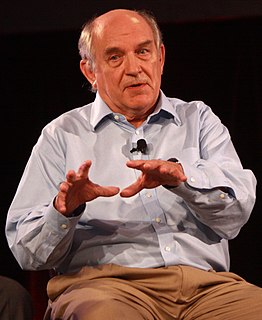A Quote by Noam Chomsky
There are few genuine conservatives within the U.S. political system, and it is a sign of the intellectual corruption of the age that the honorable term 'conservatism' can be appropriated to disguise the advocacy of a powerful, lawless, aggressive and violent state, a welfare state for the rich dedicated to a lunatic form of Keynesian economic intervention that enhances state and private power while mortgaging the country's future.
Quote Topics
Related Quotes
There are no conservatives in the United States. The United States does not have a conservative tradition. The people who call themselves conservatives, like the Heritage Foundation or Gingrich, are believers in -- are radical statists. They believe in a powerful state, but a welfare state for the rich.
The greatest obstacle to the welfare state is not greed but private charity that makes the welfare state irrelevant; the greatest obstacle to re-education of children in the name of the collective is allegiance to a higher power. More than that, the greatest obstacle to the state as god is an actual God above the state.
The State, of course, is absolutely indispensable to the preservation of law and order, and the promotion of peace and social cooperation. What is unnecessary and evil, what abridges the liberty and threatens the true welfare of the individual, is the State that has usurped excessive powers and grown beyond its legitimate function - the super-State, the socialist State, the redistributive State, in brief, the ironically misnamed 'Welfare State.'
A masterly analysis of how political interests, economic circumstances, development strategies, and local history have shaped what are surprisingly different versions of the welfare state across the developing world. The authors combine fine-grained country analyses with intelligent use of data, and explain and extend the theory and literature on the modern welfare state. The book is both scholarly and readable.
The Fascist State lays claim to rule in the economic field no less than in others; it makes its action felt throughout the length and breadth of the country by means of its corporate, social, and educational institutions, and all the political, economic, and spiritual forces of the nation, organised in their respective associations, circulate within the State.
[T]he mass-man sees in the State an anonymous power, and feeling himself, like it, anonymous, he believes that the State is something of his own. Suppose that in the public life of a country some difficulty, conflict, or problem presents itself, the mass-man will tend to demand that the State intervene immediately and undertake a solution directly with its immense and unassailable resources. This is the gravest danger that to-day threatens civilisation: State intervention; the absorption of all spontaneous social effort by the State.
Private property creates for the individual a sphere in which he is free of the state. It sets limits to the operation of the authoritarian will. It allows other forces to arise side by side with and in opposition to political power. It thus becomes the basis of all those activities that are free from violent interference on the part of the state. It is the soil in which the seeds of freedom are nurtured and in which the autonomy of the individual and ultimately all intellectual and material progress are rooted.
The welfare state corrupts family life. Even Democrats have acknowledged the destructive consequences of the welfare state on the underclass. It has rendered vast numbers of male unnecessary to females, who have looked to the state to support them and their children (and the more children, the more state support) rather than to husbands. In effect, these women took the state as their husband.
For authoritarians such as Lenin and Žižek, the dichotomy in politics is state power or no power, but I refuse to concede that these are the only options. Genuine politics is about the movement between these poles, and it takes place through the creation of what I call "interstitial distance" within the state.



































